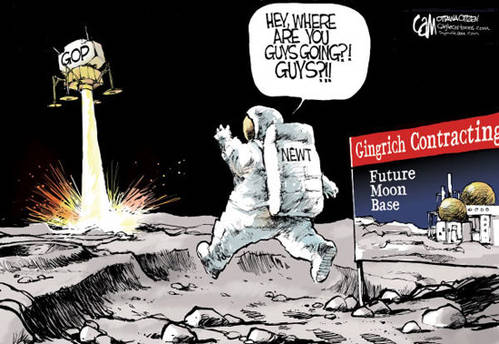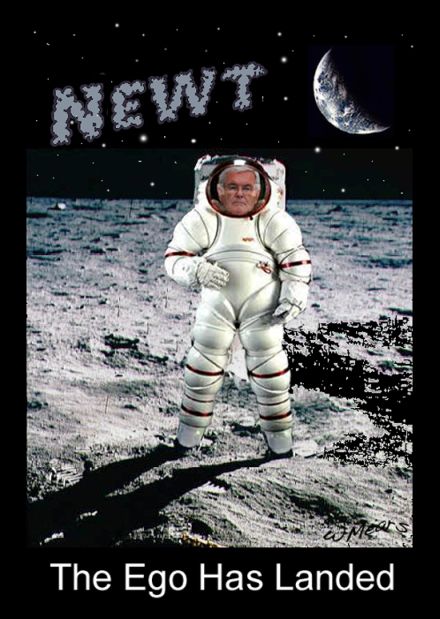Disillusioned
New member
Newt wants a moonbase, really how can you guys take him seriously?
http://abcnews.go.com/Technology/ne...n-base-flights-mars-reality/story?id=15449425
A colony on the moon? Republican Presidential candidate Newt Gingrich floated the idea before a massive audience on Florida's space coast. Thousands lost jobs there when the space shuttle quit flying, so what he told them was music to their ears -- the promise of jobs once again, another space race.
Gingrich offered his vision of an ambitious new space program. "By the end of my second term," Gingrich said, "we will have the first permanent base on the moon and it will be American." The crowd erupted in applause.
And he was just getting started; by 2020, he said, there would be regular flights to Mars.
"I am sick of being told we have to be timid and I'm sick of being told we have to be limited to technologies that are 50 years old," Gingrich said.
But what are the realities? Earth already has a space colony in Earth orbit, and it's been expensive. It is the International Space Station (no one ever came up with a catchier name because that's a political hot potato). This orbiting outpost cost $100 billion to build over 10 years, after a decade of planning, with the combined efforts of 16 countries.
The station currently it has a crew of six on board, and they spend about 35 hours a week between them on cutting-edge science. The rest of the time is spent maintaining the station.
Stop someone on the street and ask them about who is in space and you are likely to get a blank look. Interest in the space program has waned.
The first man on the moon, Neil Armstrong, joined Apollo 13 commander James Lovell and Apollo 17 commander Eugene Cernan in writing a letter to President Obama, chastising him for failing to have a replacement vehicle for the space shuttle fleet, and encouraging him to start a new space effort.
"For The United States, the leading space faring nation for nearly half a century, to be without carriage to low Earth orbit and with no human exploration capability to go beyond Earth orbit for an indeterminate time into the future, destines our nation to become one of second or even third rate stature," they wrote
NASA could certainly build a colony on the Moon. They know how to get there, and they know what to do when they land. Engineers have already designed the rockets, the spacecraft, the rovers, and inflatable habitats -- all prepared after President George W. Bush proposed in 2004 to go back to the moon.
That program was called Constellation. It lasted until President Obama took office.
But a commission, appointed by Obama and chaired by retired aerospace executive Norman Augustine, said a return to the moon just wasn't financially practical -- without an extra $3 billion a year, NASA just wouldn't have the money to make it work.
That's a tough sell in today's economy.
Obama canceled Constellation and called for yet another program, one which isn't fully funded, and has no specific destination -- perhaps a passing asteroid and eventually an expedition to Mars. Planners at NASA must have whiplash trying to keep up with the changes each administration throws at them.
Gingrich -- like Obama -- calls on private enterprise to take over parts of NASA's role. But no private company has yet put astronauts in Earth orbit. Gingrich is among many who have accused NASA of becoming bureaucratic and overly cautious. But the reality remains that space exploration is difficult and dangerous, and expensive as well.
The potential of exploring and living on the moon excites many -- including former astronaut Steve Lindsey, who commanded the last flight of the space shuttle Discovery.
http://abcnews.go.com/Technology/ne...n-base-flights-mars-reality/story?id=15449425
A colony on the moon? Republican Presidential candidate Newt Gingrich floated the idea before a massive audience on Florida's space coast. Thousands lost jobs there when the space shuttle quit flying, so what he told them was music to their ears -- the promise of jobs once again, another space race.
Gingrich offered his vision of an ambitious new space program. "By the end of my second term," Gingrich said, "we will have the first permanent base on the moon and it will be American." The crowd erupted in applause.
And he was just getting started; by 2020, he said, there would be regular flights to Mars.
"I am sick of being told we have to be timid and I'm sick of being told we have to be limited to technologies that are 50 years old," Gingrich said.
But what are the realities? Earth already has a space colony in Earth orbit, and it's been expensive. It is the International Space Station (no one ever came up with a catchier name because that's a political hot potato). This orbiting outpost cost $100 billion to build over 10 years, after a decade of planning, with the combined efforts of 16 countries.
The station currently it has a crew of six on board, and they spend about 35 hours a week between them on cutting-edge science. The rest of the time is spent maintaining the station.
Stop someone on the street and ask them about who is in space and you are likely to get a blank look. Interest in the space program has waned.
The first man on the moon, Neil Armstrong, joined Apollo 13 commander James Lovell and Apollo 17 commander Eugene Cernan in writing a letter to President Obama, chastising him for failing to have a replacement vehicle for the space shuttle fleet, and encouraging him to start a new space effort.
"For The United States, the leading space faring nation for nearly half a century, to be without carriage to low Earth orbit and with no human exploration capability to go beyond Earth orbit for an indeterminate time into the future, destines our nation to become one of second or even third rate stature," they wrote
NASA could certainly build a colony on the Moon. They know how to get there, and they know what to do when they land. Engineers have already designed the rockets, the spacecraft, the rovers, and inflatable habitats -- all prepared after President George W. Bush proposed in 2004 to go back to the moon.
That program was called Constellation. It lasted until President Obama took office.
But a commission, appointed by Obama and chaired by retired aerospace executive Norman Augustine, said a return to the moon just wasn't financially practical -- without an extra $3 billion a year, NASA just wouldn't have the money to make it work.
That's a tough sell in today's economy.
Obama canceled Constellation and called for yet another program, one which isn't fully funded, and has no specific destination -- perhaps a passing asteroid and eventually an expedition to Mars. Planners at NASA must have whiplash trying to keep up with the changes each administration throws at them.
Gingrich -- like Obama -- calls on private enterprise to take over parts of NASA's role. But no private company has yet put astronauts in Earth orbit. Gingrich is among many who have accused NASA of becoming bureaucratic and overly cautious. But the reality remains that space exploration is difficult and dangerous, and expensive as well.
The potential of exploring and living on the moon excites many -- including former astronaut Steve Lindsey, who commanded the last flight of the space shuttle Discovery.



